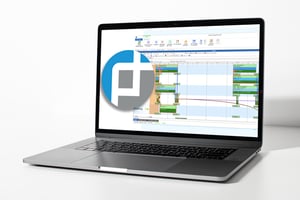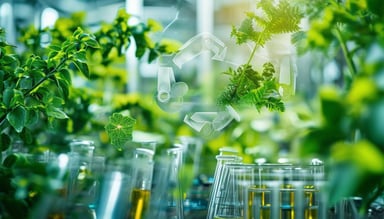Sustainable Resource Planning and Circular Economy
Sustainability and efficiency are not merely desirable attributes but essential practices in chemical manufacturing. As global awareness of environmental issues grows, companies are increasingly pressured not only to comply with stringent regulations but also to proactively contribute to a more sustainable and circular economy. One of the most effective strategies to achieve these goals is through innovative resource planning facilitated by cutting-edge software solutions.
This blog explores how integrating PlanetTogether’s Advanced Planning and Scheduling (APS) software with leading Enterprise Resource Planning (ERP) and Supply Chain Management (SCM) systems like SAP, Oracle, Microsoft, Kinaxis, Aveva, and others, can transform a chemical manufacturing facility into a beacon of sustainability and efficiency.

The Urgency for Sustainable Practices in Chemical Manufacturing
Chemical manufacturing is inherently resource-intensive, dealing with complex processes that involve volatile materials and energy-dense procedures. The production often results in significant environmental footprints, from greenhouse gas emissions to chemical waste. However, by rethinking resource management through the lens of sustainability and circular economy principles, facilities can minimize waste, reduce carbon footprints, and optimize resource use.
The circular economy is a systemic approach to economic development designed to benefit businesses, society, and the environment. In contrast to the 'take-make-waste' linear model, a circular economy is regenerative by design and aims to gradually decouple growth from the consumption of finite resources. For chemical manufacturers, this means designing processes that allow for the maximum reuse and recycling of materials and byproducts, significantly reducing environmental impact.
-May-08-2024-04-36-12-8483-PM.png?width=300&height=48&name=logo%20(2)-May-08-2024-04-36-12-8483-PM.png)

The Role of PlanetTogether in Sustainable Resource Planning
PlanetTogether APS is a robust platform that offers comprehensive features tailored to the complexities of chemical manufacturing. It enhances production planning and scheduling by optimizing the use of available resources, reducing downtime, and increasing throughput. The software’s capabilities in scenario planning and simulations allow manufacturers to foresee the outcomes of various operational strategies and choose the most sustainable options.
Key Features of PlanetTogether for Chemical Manufacturing
Advanced Scheduling Algorithms: These algorithms consider numerous constraints and objectives to maximize efficiency and minimize waste.
Real-Time Visibility and Control: This allows for immediate responses to production issues, reducing material wastage and energy consumption.
What-If Scenarios: Facility managers can simulate different operational strategies to assess their environmental impacts and resource utilization before implementation.

Integrating PlanetTogether with ERP, SCM, and MES Systems
Integration with ERP Systems
SAP
Integrating PlanetTogether with SAP can enhance the visibility of inventory levels, production capacities, and demand forecasts. This integration allows for more accurate planning and scheduling, reducing overproduction and underutilization of resources—key principles of the circular economy. For example, excess chemicals that might have been disposed of can instead be redirected into productive use.
Oracle
Oracle's ERP systems are renowned for their robust supply chain and inventory management features. By integrating with PlanetTogether, chemical manufacturers can leverage enhanced data analytics and machine learning capabilities to optimize their production schedules based on predictive maintenance, thereby minimizing downtime and reducing waste.
Microsoft Dynamics
For facilities using Microsoft Dynamics, integrating with PlanetTogether can streamline operations by aligning production planning with financial and human resources planning. This holistic view ensures that sustainable practices are economically viable, aligning cost savings with environmental benefits.
Integration with SCM and MES Systems
Kinaxis
Kinaxis provides advanced SCM solutions that offer real-time supply chain planning and what-if analysis capabilities. Integrating Kinaxis with PlanetTogether allows chemical manufacturers to not only plan but also react swiftly to changes in supply chain conditions, such as sudden shifts in raw material availability, while maintaining sustainable practices.
Aveva
Aveva’s MES solutions focus on maximizing process efficiency and quality. The integration with PlanetTogether can provide a deeper insight into the production process, facilitating better control over the use of energy and resources. This can significantly contribute to sustainability by optimizing energy consumption and reducing waste.

Implementing Sustainable Resource Planning
Assessment of Current Systems and Processes: Understand the existing workflow and systems in use and identify areas for improvement.
Choosing the Right Integration Platform: Depending on the existing ERP/SCM systems in use, select an appropriate integration platform that aligns with PlanetTogether and the company’s operational needs.
Pilot Testing: Before full-scale implementation, conduct pilot tests to ensure that the integration works as intended and that all systems communicate effectively without data silos.
Training and Change Management: Ensure that all stakeholders from operators to top management are trained on the new systems. Implement change management strategies to help staff adapt to the new workflows.
Continuous Improvement and Feedback Loop: Establish a continuous feedback loop to monitor the system’s performance and make necessary adjustments. This is crucial for adapting to changes in production demands and environmental regulations.
The integration of PlanetTogether’s APS with ERP and SCM systems in a chemical manufacturing facility represents a significant step towards achieving sustainability and adhering to the principles of a circular economy. This strategic approach not only enhances operational efficiency and compliance but also positions the company as a responsible entity committed to environmental stewardship.
As the industry moves forward, it will be the companies that embrace such integrated, sustainable practices that will lead the way in innovation and competitive advantage in the global market. Are you ready to take your manufacturing operations to the next level? Contact us today to learn more about how PlanetTogether can help you achieve your goals and drive success in your industry.